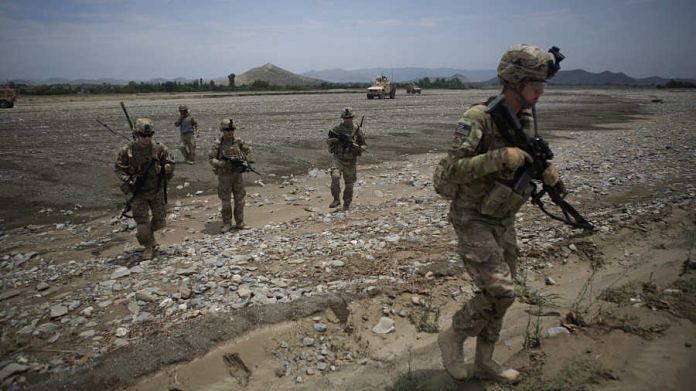No definitive deadline for withdrawal of troops
US Secretary of State Mike Pompeo recently remarked that President Donald Trump has given him a mandate to withdraw US troops from Afghanistan before the 2020 Presidential elections. Though Pompeo soon changed his statement, saying there was no definitive deadline for American withdrawal.
Meanwhile, Taliban has continued to mount lethal attacks on Afghan security forces and expand its control across the country. In the most recent instance, on 29 July, Taliban overran the Mizan district in the southern Zabul province. Two days later, on 31 July, a bomb planted by Taliban killed 35 civilians in the western province of Farah.
Taliban is gradually winning the war, one district at a time
According to Long War Journal, which closely tracks developments in Afghanistan, Taliban currently controls 17 per cent of the country’s districts. In addition, it contests 48 per cent of the districts. Meanwhile, the Kabul-centered, Afghanistan government controls 35 per cent of the districts.
Effectively, today Taliban controls or contests 65 per cent of Afghanistan.
Over the past decade, Taliban has continued to make incremental gains in Afghanistan. For instance, Taliban fought with the Aghan forces for a year, before it succeeded in capturing the Mizan district.
US-Taliban talks mask a lot of ugly realities
During his 2016 presidential campaign, Trump had promised to end all of “America’s wars”. The most significant of these has been the US war in Afghanistan. Having fought for over 18 years now, the US is experiencing severe war fatigue.
This prompted Trump to appoint Zalmay Khalilzad to negotiate a peaceful resolution with the Taliban. While Khalilzad has already had eight rounds of talks with the Taliban, the two sides have struggled to reach an agreement.
But the idea of a ‘peace treaty’ between the US and Taliban masks a lot of painful realities.
To begin with, Taliban has refused to negotiate with the Afghanistan government. Not only does Taliban consider them to be an illegitimate representative of the Afghan people, they are also vehemently opposed to sharing power with the Kabul government.
Thus, analysts argue that by entering a peace deal with the Taliban, the US is essentially signaling two things.
First, it is telling the Kabul government to consolidate whatever territory they currently control. Second, from here on, the Afghan government is by itself – at the mercy of Taliban.
Moreover, Taliban’s refusal to share power with the Kabul government essentially means that they would continue their ‘jihad’ against it – until they manage to capture all of the country.
Taliban has not changed, it’s still a fundamentalist organization
As the US inches closer to withdrawing from Afghanistan, it becomes pertinent to ask what would Taliban in power seem like?
Every piece of available evidence suggests that Taliban has not become moderate since it was forced out of power in 2001.
The group recently released a video which said, “Is 24-hour music and song, obscene dramas, movies, desecrating the creed of a nation and degrading their cultural heritage considered progress? Can promoting western ideas ever be considered civilization and improvement?”
Moreover, women and minorities fear severe persecution once Taliban is in power.
This is the moderate Taliban:
"Is 24-hour music and song, obscene dramas, movies, desecrating the creed of a nation and degrading their cultural heritage considered progress? Can promoting western ideas ever be considered civilization and improvement? " pic.twitter.com/rH6HCDUsD5
— Bill Roggio (@billroggio) July 23, 2019
Meanwhile, in terms of its military strategy and the “war against the west” – Taliban continues to adhere to its older practices and ideas.
It recently claimed that the “9/11” attack was “justified” because of US’ “interventionist policies”.
More substantively, four recent reports by the UN suggest that Taliban has continued to maintain strong ties with Al Qaeda. In addition, Taliban also has close ties with Lashkar-e-Tayyiba, Haqqani Network, and other Central Asia jihadist groups.
Taliban is deeply entrenched in the global jihadi networks and its interest go much beyond just implementing Sharia law in the country.




Trump is doing right for America….but that is sinking India in Afghanistan !!!